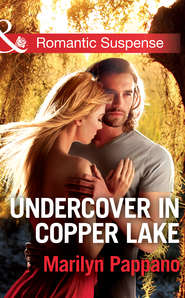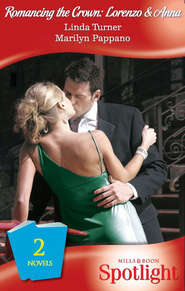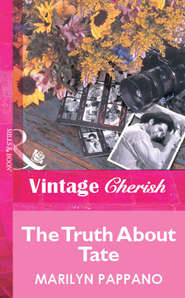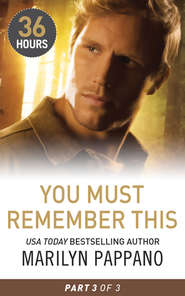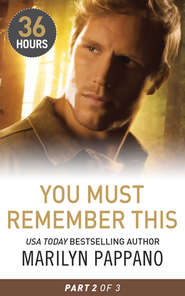По всем вопросам обращайтесь на: info@litportal.ru
(©) 2003-2025.
✖
You Must Remember This
Автор
Год написания книги
2019
Настройки чтения
Размер шрифта
Высота строк
Поля
“I don’t know.”
“So Stone took your fingerprints and checked missing persons reports and got nothing. Has he done that recently?”
“Why would he?”
“Maybe, when he checked, your family or friends or employer hadn’t yet realized that you were missing. Maybe you were on vacation and not expected back for several weeks. Maybe they filed a report a few days or weeks later.” Picking up a pen, she made a note on the pad next to the computer. Tomorrow she would be at the police department. She would talk to Stone about trying again. “Do you have any scars, tattoos or distinguishing marks?”
He mumbled his answer as if he preferred not to acknowledge their existence. “Scars.”
Her gaze followed his right hand to his left arm, where he rubbed the thickened skin. She made a note of its location and length even as she wondered what he had done to earn such an injury.
“It’s a defensive wound.”
Given a little time, she could have figured that out. The scar ran four inches along the inside of his arm, as if he had raised his arm to ward off an attacker. But who had attacked him and why? Had he been an innocent victim or an equally guilty transgressor?
She would like to believe “innocent victim,” but it was hard to cast him as either innocent or a victim. On the other hand, it was easy to see him as aggressive, strong, take-charge, bold. It was easy to imagine him meeting an attacker head-on, giving as good as he got.
Unless his attacker was someone he couldn’t defend himself against—a woman, perhaps, a friend or an authority figure. Or unless he believed he deserved the attack. Which brought her back to her original question: what had he done?
Knowing that he could offer no more information than her wild imagination, she pressed on. “You said scars. What about the others?”
“What does it matter?”
“The more identifying information we can provide, the better the chances of getting a match.”
“Assuming that there was someone who cared enough to file a missing persons report.”
“You don’t think there was?”
His fingers knotted, and his eyes turned the bleak blue of a sunless wintry day. “I don’t know.”
Under the best of circumstances, it was a vaguely dissatisfying answer. When it applied to every area of your own life, when it answered even the simplest, most basic questions—What is your name? How old are you? Where do you live?—it must be frustrating as hell.
“You weren’t wearing a wedding ring?”
“No. No tan line, either.”
“Which proves nothing. There has to be someone—a wife, a girlfriend, friends, neighbors, co-workers. You can’t have lived so isolated that no one’s noticed you’re gone.”
“I don’t know.” Rising from his chair, he paced to the other side of the table. He was restless, edgy, and he made her feel edgy. She fiddled with her pen as she watched him.
“What about the other scars?”
For a long moment, he looked at her, then answered in a rush. “I’ve been shot twice—once in the back, left side, down low, and once in the chest, upper right side. There are two entry wounds, plus two surgical scars where the bullets were removed. Based on the way scars mature, the doctor says one is a couple of years old, the other probably a couple of years older than that.”
“And the scar on your arm?”
“It’s older. I’ve had it since I was a kid.”
“The doctor told you that?”
“No. I just know….” Frustrated, he gestured toward the computer. “What can you do with that?”
She could do anything, go anywhere, be anyone. His interest, of course, was much narrower. What could she do for him? It was her turn to parrot his answer. “I don’t know. I need a name, a town, something to go on.”
“If I had a town, I’d be there, and if I had a name, I wouldn’t need—”
You. She smiled faintly. She knew that, of course. If she didn’t have something tangible to offer, he would have no interest in her. Too bad that she had nothing to offer—just lots of questions and no answers. “You said you’ve had this feeling of familiarity about the town. What about the people?”
He shook his head.
“No one seems familiar? No one brings a particular response?”
He stood at the window, back straight, very still, and stared out. The sun’s last rays shining through the partially opened blinds cast a pattern across his face, with a shadow across his mouth and another over his eyes. At last, he answered, his voice so grim that she didn’t want to see his eyes. “Olivia Stuart.”
Juliet drew her feet onto her chair seat and wrapped her arms around her knees to contain a shiver. For such a short time in town, she’d learned a lot. Olivia Stuart had been widely admired in Grand Springs, hailed as the town’s best mayor ever. Her death last June, presumably from a heart attack, had stunned everyone. The news that the heart attack had been drug-induced had sent shock waves through the town. Last October the police had arrested one of her murderers—a professional killer by the name of Joanna Jackson—and were still looking for another of those involved, Dean Springer. Springer had hired Joanna, but to this day, no one knew whom he was working for. No one knew why his mysterious boss had wanted Olivia Stuart dead.
Maybe Martin Smith knew.
As if he knew the direction her thoughts were traveling, he smiled mockingly. “I was questioned and cleared. At the time the mayor was given the fatal injection, I was somewhere out on the highway. A couple of Grand Springs’s respectable citizens can vouch for that.”
But that only meant that he hadn’t been the one to actually give the injection. Could he be the one who had ordered it? Could he have held a grudge against the mayor with lethal consequences? Juliet didn’t ask the questions aloud, but Martin had already asked them and failed to come up with answers.
“Could you have known Olivia?”
“Maybe.”
“Could you be a relative?”
“No.”
“How can you be so sure?”
“She had a son and a daughter. I’ve met both of them, and they don’t have a clue who I might be.”
It shouldn’t take you long to hit a dead end, he’d said this afternoon, and he had been right. She was running out of questions, and they had learned nothing. “What kind of response does she bring?”
He shrugged but continued to stare out. “That night in the ER, I heard that she’d had a heart attack, and…I was sorry. I didn’t have any idea who she was, but…it mattered. It was as if her death—or her life—was important to me in some way.”
“Maybe you’d done business with her. Maybe you were on your way here to meet with her.”
“Stone checked her appointment book. Everyone listed in it is present and accounted for.”
“Maybe your business with her was personal.”
He shook his head. “She was very organized. She kept track of her personal business as well as her professional matters.”
“It’s human nature to feel some measure of sadness when you hear someone has died. Maybe that’s all it was. You were just being human.”







